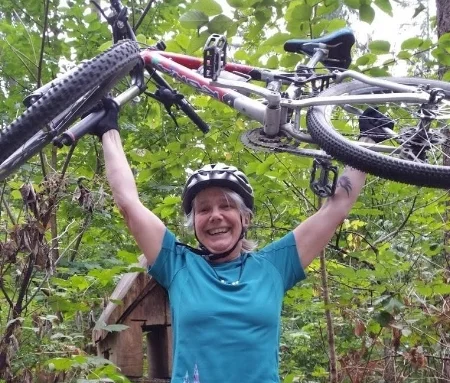Start with walking
by Jude Goodwin
The door clicks shut behind me as I set out across the grass. It is wet, and a bit chilly, but the trees along the avenue are bursting with the flaming colours of autumn and the backdrop of dark grey clouds broken by blades of October sunshine creates a stunning fresco for my daily walk. I am snug in my raincoat and I pick up the pace.
I pass through the park, marveling at its carpet of orange and red, pass by the blackberry riot, now picked clean of its fruit, pass along the bog and smile at the sounds of geese arguing on the water. I pass all the places I have passed and enjoyed every day for the past 150 days, and I smile to myself. Life is good.
My first 30 minute walk seemed to take forever. I kept looking at my phone, shocked that I had been walking for only 15 minutes, then only 17 minutes. I worried about the work I had left undone, the shopping I still needed to do, the dinner I was to make. I looked again at my phone - 25 minutes. And I felt silly. As a former athlete, a 30 minute walk seemed to be a ridiculous thing. So short, barely even getting my heart rate up, and not far enough to actually get into the woods. It was a foolish idea, to walk 30 minutes a day. How could it possibly help me?
It was May. I was overweight, and hadn’t been on my bike for a year. I hadn’t been into the gym in 5 years. I had tried to get back to running but threw my back out. In terms of health and wellness, the gap between where I was in my life and where I wanted to be stretched before me growing ever wider as the months passed. I despaired. Old age leered at me around every turn. Old age and ill health.
But I have learned, over my 64 years, that great things can be done only if one is willing to start small. So I decided I would make myself get outside and walk 30 minutes a day. How hard could it be?
If you look up ‘walking daily’ on Google, you’ll find all sorts of reasons why a daily walk is good for you. You’ll read that it prevents dementia, helps you lose weight, strengthens your heart, lowers the risk of disease, and more. But part of me, the part that used to train 6 days a week, laughed at the idea that a 30 minute walk could have any significant impact on someone’s health.
That was a year or so ago. I am now 35 pounds lighter, my blood sugar is back to normal, my sleep apnea and snoring have almost disappeared and I am absolutely thrilled most of the time, especially when I put on my old bike jerseys and they fit again.
Did I do all this with a 30 minute daily walk? Well, no. Not exactly. But here’s what happened.
I started walking daily, and even though I didn’t want to do it and could think of a million reasons why I wouldn’t do it, I kept doing it. And because I was taking the time and investing in myself, prioritizing my well being, I started to believe that I could be healthy again. (Breathing the fresh air, smelling the forests and ocean and rivers probably helped as well.) Eventually I hooked up with a personal trainer and took a fitness assessment and set up a plan for the gym. Eventually I downloaded an App called My Fitness Pal and started counting my calories. Eventually all sorts of things happened that helped me get to where I am now. But it started with that 30 minute walk. That commitment I made to myself.
So if you, right now, want to improve your health and your well being, here is how to do it:
1. Plan to walk 30 minutes every day.
Your first few walks will help you devise a ‘route’ - use your phone and time yourself. Having a route you can take without having to decide where to go will remove a barrier to getting out there. Of course, there will be days when you walk the oceanfront, or the river trails, or the estuary - but most days you just want to step out the door and get the job done. This is why a regular loop comes in handy. Keep a steady pace. Take a bottle of water.
2. Leave your dog at home.
For these walks, I don't recommend taking your dog even though it makes sense to walk the dog at the same time. The thing is, it can create a barrier. Some neighbourhoods required the dog to be on leash and some dogs will stop a million times to smell the bushes, or pull on the leash, or bark at other dogs. And of course you'll come across other dog owners and dog walkers and there will be conversation. All of this will prevent you from actually walking.
3. Consider a body journal.
Purchase a nice little blank notebook and write about your aches and pains and plans and hopes and dreams and don't worry about anyone judging you. This is your private place. You can sketch up a calendar and mark down your walks. Where did you go? How was the weather? Eventually you'll use this journal to track other things like food or weight, or fitness outings but for now, start with your walks.

